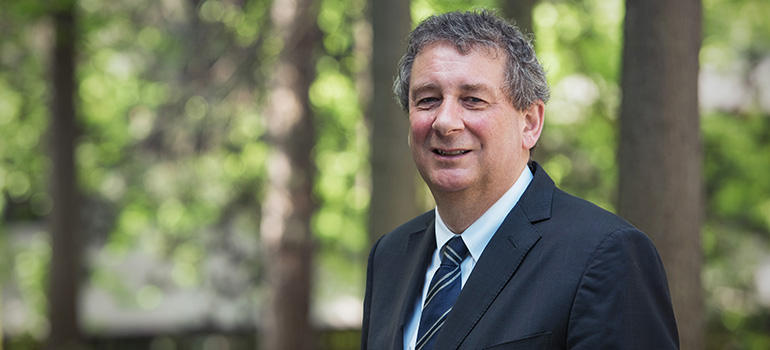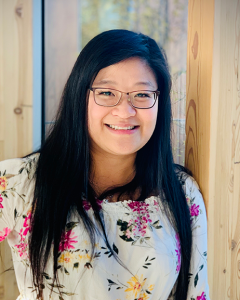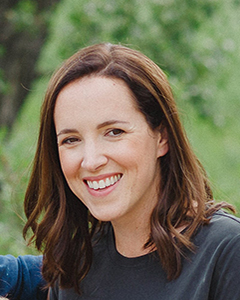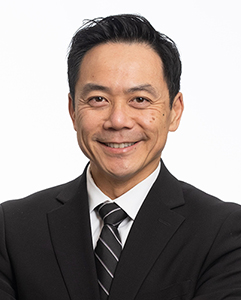A Message to our Alumni

I wanted to take a moment to reach out during this unprecedented time to thank you.
In the space of a few weeks, we have all had to adapt to new ways of living and working together. The speed with which we have been able to mobilize during this transition is a reflection of your commitment to public health and solidarity as a member of the Faculty of Medicine’s alumni community.
Health care delivery involves many diverse professions, and this crisis has no doubt affected you in different ways. We are grateful for the contributions you make every day, and it makes us realize how connected we are to other health professionals in our community and around the world who are also working to manage the impact of COVID-19. You may be treating patients on the front line, finding new ways to deliver or inform the public about health care in the face of clinic closures and social distancing measures, or utilizing your research expertise to better understand and slow down the transmission of this virus. No matter what role you play in health care, I hope you share our collective pride in how members of our Faculty of Medicine alumni community around the globe are rising to the challenge.
For example, more than 600 UBC medical students have responded by volunteering to assist the 811 provincial health advice and information telephone line, providing health guidance and alleviating fear and confusion, as well as engaging in other public health activities related to managing the outbreak. In addition, several of our researchers have received federal funding to launch studies focused on accelerating the development, testing and implementation of measures to deal with the COVID-19 outbreak. As an institution of learning and knowledge creation, we are doing our part to take action in ways that will both save lives today and improve our response to outbreaks in the future.
I invite you to connect with your classmates and our alumni community to support each other through this difficult time, and to read more about the response from UBC along with the latest research at our website.
In spite of the physical distances that currently separate us, may we take comfort in knowing that we are connected by our shared understanding that the health of our cities, provinces, and planet depends on how well we care for each other. Wherever in the world this message finds you, please know that the UBC Faculty of Medicine is committed to your health and safety, and we are grateful to you as a member of our alumni community, and for your partnership in transforming health for everyone.
Sincerely,
Dermot Kelleher MB, MD, FRCP, FRCPI, FMedSci, FCAHS, FRCPC, AGAF
Professor, Department of Medicine
Dean, Faculty of Medicine
Vice-President, Health
The University of British Columbia
Poh Tan, PhD’08
 Entrepreneur. Scientist. Researcher. Polynesian dancer. Educator. PhD candidate, again! Dr. Poh Tan, PhD’08, is all these and more.
Entrepreneur. Scientist. Researcher. Polynesian dancer. Educator. PhD candidate, again! Dr. Poh Tan, PhD’08, is all these and more.
Describe what you do, in a few sentences.
I am an entrepreneur, scientist, researcher, and educator. I am the founder and owner of two businesses and I am currently pursuing my second PhD in Education at Simon Fraser University (SFU) where my research focuses on scientific literacy.
What do you consider some of your greatest achievements to date?
I have quite a few, but the higlights I would like to tell people about are:
- Founder and CEO of Innoguidance Consulting
- Children’s book author in collaboration with my children
- Scientist in Schools and Community Scientist for Science World. I have been part of this program almost since the inception of the program.
- Speaker at TEDxStanleyPark 2013: Myths and Misconceptions on Stem Cells: https://www.youtube.com/watch?v=MwV1nBiYlFw
- Speaker at TEDxUnisinos 2017: What I learned about life and dreams from my Grade 7 teacher: https://www.youtube.com/watch?v=691sXQrzaWA
- Awarded the SFU Dean of Education’s Kris Magnusson Emerging Leader Award
- Initiated, developed and maintained two research partnerships (Unisinos University and University of Saskatchewan)
- Editor-in-Chief for SFU Educational Review where under my leadership grew readership by 100%, double submissions, creation of an editorial advisory board, and led the journal to be listed on the Directory of Open Access Journals.
- Interviewed for my research on Radio ABC in Novo Hamburgo, Brazil: (https://www.pohtanphd.ca/wp-content/uploads/2020/02/ENTREVISTA-ONLINE.mp3)
- Selected as one of 50 inspiring alumni for the SFU, Faculty of Science: https://www.sfu.ca/science/alumni-community/inspiring-alumni1/profiles/poh-tan.html
- Featured in the Burnaby Now in 2013 for my work: https://www.burnabynow.com/news/the-drive-to-succeed-1.408850
Name the last book you couldn’t put down.
I read a variety of books:
- Fiction: The Woman in Cabin 10 by Ruth Ware
- Non-Fiction: Ho’oulu: Our time of becoming by Manulani Aluli Meyer
- Non-Fiction: The Immortal Life of Henrietta Lacks
- Classics: All books written by Enid Blyton
What is the best professional advice you’ve received?
Always have big dreams and big goals and never let nay-sayers affect or dictate how and why you have big goals.
Always treat other with respect.
What is your favourite UBC memory?
I finished my PhD in the Department of Experimental Medicine from the UBC Faculty of Medicine and my work involved late nights in the laboratory. My friends and would often go to Blue Chip Cookies to get two cookies to keep us going through the night.
Biggest risk you’ve taken to date?
I’ve always wanted to be entrepreneur to start my own business and venture on my own. With support from my family, I decided to leave a great job as a Product Manager at Vancouver’s largest biotech company to start my own consulting company. It was difficult to leave my colleagues who I had built great relationships with but I wanted to venture into entrepreneurship. I had many positive support from my peers and network, but I also had a few acquantainces who felt I was taking a huge risk and making the biggest mistake in my life. Never let nay-sayers prevent you from taking action on your goal. Your supporters will always be honest with you and support you throughout.
What is your next challenge/goal?
I love starting new projects and new ventures. Currently, I am working with a colleague who is also a researcher at SFU on building a business for digital learning. We will be presenting our work at Science World and UBC’s largest STEM conference.
What led you to choose your area of study for your degree?
My PhD topic is in stem cell research. In particular I studied blood stem cells called hematopoietic stem cells. I didn’t seek out to work with the stem cell field, but my ultimate goal was to work on a project that would translate to actionable and real solutions for patients who suffered from cancer. I guess you can say, the field chose me, rather than the other way around. I loved my project and to this, day I still use my expertise and background to help the public understand and navigate the science behind stem cell research.
Did you almost study something else – or pursue a different path?
This is a very interesting question, because as of now, I am completing a second PhD in Education, a field that is quite different from the one I obtained from UBC. In my current PhD, there is no lab work and instead focused on concepts, and theories. In a way, I AM studying something else, but both of my PhDs are necessary for the work that I want to do, bring a different approach to teaching and learning about science. One that considers the rigors and wonders of scientific experimentation and discoveries through other lenses that come from disciplines outside of the Sciences.
What advice would you give to current Faculty of Medicine students?
I can give advice to student who want to pursue a PhD in the Faculty of Medicine and to them I want to say the following:
- Obtaining a PhD means, perseverance, resilience and hard work, if you are not willing to commit time, energy and interest, it will be a tough journey.
- Have the courage to ask questions no matter the question and always be open to learning from your colleagues from different backgrounds.
- Stay authentic and remain kind and respectful regardless of how tough the PhD journey may be.
Please name a few of your favourite hobbies and activities.
My most favourite hobbies are: Polynesian dancing (I’ve been dancing for over 16 years and still going), playing my ukulele (I’ve only been playing for 1.5 years, but it’s been really good for the soul), and sea fishing (no salmon fishing for me, cod is best)
My most favourite activities: spending time with my two kids, especially building projects with them and co-authoring books together and having family board game nights.
Name something that is on your bucket list. Have you completed it?
I have many things on my bucket list that I have yet to complete:
- Traveled to Egypt, ride a camel and visit the Pyramids (Completed with my husband)
- Traveled to the Serengeti and experience the annual migration of the wildebeest (Completed)
- Traveled to South East Asia’s golden triangle (Laos, Thailand, and Myanmar) – only went to Laos and Thailand so far
- Place in the top three for Polynesian dancing (Placed 1st place in solo and duo competion)
- Travel to Antartica (Have not done this yet)
- Travel the Silk route (Have not done this yet)
What are the best aspects of your career?
I am continually learning in all that I do and what I most enjoy is that I still get to help those who want to reach their big goals.
What are the most challenging aspects of your career?
Having the time to do everything that I want to do while juggling my time as a mother to two boys, as a wife to my supportive and caring husband, an entrepreneur maintaining two business and starting a new one, and self-care. In other words, time.
What is one question you’re often asked about your career?
How does your research help the public?
Claire O’Gorman, MPH’12

Finding the intersection of community development and health, Claire O’Gorman, MPH’12, utilized her education in public health and nursing to creating Alberta’s first supervised drug-consumption site, Safeworks.
Describe what you do, in a few sentences.
I am a Registered Nurse and Program Manager at Safeworks in Calgary, where alongside an incredible team, I lead the operations of two harm reduction-based outreach teams and the supervised consumption service. Our program has expanded exponentially in the last three years in response to the opioid overdose crisis.
What do you consider your greatest achievement to date?
Although a community coalition of stakeholders had been engaged in working towards supervised consumption services in Calgary for some time, the actual implementation of services happened within a very short period; the Safeworks team was able to mobilize, recruit and train staff, and deliver supervised consumption services rapidly in response to the need in our community.
Please list a few of your current accolades/awards received, volunteer positions, and/or past job positions.
Before joining Safeworks, I worked at the Calgary STI clinic when I first moved back to Calgary in 2014. Before that, I was Program Director at YouthCO in Vancouver, where I had the opportunity to learn about harm reduction, communicable diseases, and the impact that stigma can have on communities.
I have been recognized for my work with Safeworks through the College and Association of Registered Nurses of Alberta Nursing Excellence Award (2018) and a Calgary Avenue Magazine Top 40 Under 40 Award (2018).
Name the last book you couldn’t put down.
To be honest, I have a toddler at home, so I don’t read many books these days.
What is your favourite UBC memory?
I met an incredible group of people through the School of Population and Public Health, and we became really close friends. We had a lot of fun together and still do. I’m grateful for the support and teachings they provided me, in addition to the learnings and support from UBC staff and faculty.
Biggest risk you’ve taken to date?
Deciding to move back to Calgary, my hometown, took some courage; I didn’t have a job lined up, and was worried about whether I would find work in harm reduction here in Alberta. I was lucky to quickly land in a position that I love.
What is your next challenge/goal?
The greatest challenge wasn’t to implement supervised consumption services in Calgary , but to continue advocating for these services and the ongoing operations, monitoring, and adjustments.
What led you to choose your area of study for your degree?
I did a Masters in Public Health at the School of Population and Public Health. I have always been interested in the social determinants of health, health equity, and health justice, and an MPH at SPPH gave me the knowledge and skills to enact change at a program and policy level.
Please name a few of your favourite hobbies and activities.
I enjoy spending time in nature, and keeping up with the national harm reduction community on Twitter.
Name something that is on your bucket list. Have you completed it?
I can’t say I’ve ever made an official bucket list. I like to take opportunities as they present themselves, rather than trying to work through a check-list.
What are the best aspects of your career?
I was drawn to population and public health because of my interest in social justice and health equity. I am particularly interested in the intersection of community development and health. The best aspect of my career is getting to see the positive impacts that programs and policies can have when they are designed alongside those they serve, and with health equity in mind. I really enjoy spending time in the supervised consumption site spending time with the team and our clients, and seeing the benefits of the relationships we have built in our community.
What are the most challenging aspects of your career?
At times, it’s difficult to feel like I’m constantly justifying or rationalizing the work that I do. Harm reduction is pragmatic and a justice-based approach to caring for people who use substances. To me, it is logical and easy to understand. But for a lot of people, it requires a paradigm shift in order for them to see why I might do, let alone enjoy, this work.
Derek Mah, BA’96, BSc (Phys Ther)’99, LLB’03
Although no longer a practicing physiotherapist, Derek Mah, BA’96, BSc (Phys Ther)’99, LLB’03, has been able to merge his education in physical therapy and law in order to help people with personal injury litigation.
Describe what you do, in a few sentences.
I received my Bachelors of Science in Physical Therapy from UBC in 1999 and practiced full time for a year before returning to law school. I worked as a physiotherapist throughout law school and graduated from UBC School of Law in 2003. Now, I practice personal injury litigation.
What do you consider your greatest achievement to date?
My family – I have a wonderful wife, who is also a UBC graduate and works as a social worker at Vancouver General Hospital, and 2 children, 15 and 13 years old.
Please list a few of your current accolades/awards received, volunteer positions, and/or past job positions.
Outside of work, I devote the majority of my time to coaching youth sports. I am an assistant coach for my son’s ice hockey team and the head coach of my daughter’s soccer team. Working with children is fantastic – they are full of raw excitement which is a good reminder to live in the moment.
Name the last book you couldn’t put down.
I am an avid hockey fan and enjoyed reading Wayne Gretzky’s Stories of the Game. It was very insightful to see how one of the greatest hockey players strategized and thought about the game.
What is the best professional advice you’ve received?
Focus on doing good work and everything else will fall in place. I know that many young professionals worry about income especially if living in Vancouver and this advice was very true for me. It may sound cliché but if you do good work, you will be rewarded.
What is your favourite UBC memory?
One of my fondest memories was my first day in rehab school. At that time, the first-year physical therapy and occupational therapy students shared most classes together. A professor welcomed us and said that we fought like sharks to get into the program but now, we could play like dolphins. The metaphor was very true as many of my closest friends and best memories are from my time in rehab.
What is your next challenge/goal?
I would like to participate in a volunteer project such as building a school or doing missionary work.
Please name a few of your favourite hobbies and activities.
As a teenager, I enjoyed playing hockey and painting. In high school, I put both of them together and began to paint hockey players. Then, my friend and I painted the Canuckmobile – a car decorated with Vancouver Canucks players. More recently, I have been painting custom hockey figures and did a set for my son’s hockey team last season.
Name something that is on your bucket list. Have you completed it?
As a child, I did not have the opportunity to travel outside of North America and so, travelling the world is on my bucket list. We went to Australia and New Zealand last year and hope to do Europe and Africa soon.
What are the best aspects of your career?
I enjoy working with people especially when I am able to bring a resolution to such a traumatic time of their lives. In many ways, the ability to work with people during these times reminds me of why I chose a physiotherapy career.
What are the most challenging aspects of your career?
On the flip side, working with people can be very challenging as well. Navigating the legal system and understanding legal language is often daunting and overwhelming. I have learned that patience and listening are two attributes that will serve you well no matter what career you choose.
What is one question you’re often asked about your career?
Why did you leave physiotherapy to become a lawyer? I do not have a great answer to that question. At the time, I decided to write the LSAT and see if I would be accepted to law school. After graduating, I found that personal injury litigation allowed me to combine both interests together.
